Stray dogs of Russia vs cats of Europe
Belarusian cinema: (don’t) mind the gap
Theatre: bet on war in Belarus, two ways for those who are abroad
Pop & rock. Existence in a state of monologue
Belarusian Art: In the Labyrinths of Ambivalence
Stray dogs of Russia vs cats of Europe
Belarusian literature is alive. And we can’t help but be happy. During the period outlined in the review, a special thematic site has become noticeable, which is perfect for delving into the context and for comforting anxiety. For example, processes are underway, books are published, awards are presented. However, these processes are radically different within Belarus and abroad. In Belarus, the functionaries of literature run the risk of becoming cross-eyed, because they look too closely at their eastern neighbour, and quietly remove textbook works that have suddenly become too politically incorrect from the shelves. And abroad, writers have complete freedom of action, but at the same time they are limited by internal lack of freedom – the desire to avoid conflicts and please everyone.
Trends
- Cutting vectors: Belarusian authors and their publishers as the face and voice of Belarus in the world (outside); pro-government writers as vassals of the Russian literary process (inside).
- Reinforcement of the symbolic cleansing of the literary process (inside).
- The crisis of Belarusian book distribution (outside).
- Partisanship and Aesopian language (inside).
Map of meanings
Let’s start with the main thing. In September, the Belarusian PEN published a study entitled “Sphere of culture of Belarus in 2022-2023. Repression. Tendencies”. This additional monitoring of violation of cultural rights is important because it accumulates information from 42 interviews with experienced cultural figures, the absolute majority of whom lived and worked in Belarus from mid-March to early June 2023. Due to the specificity of PEN, the largest number of anonymous informants comes from the sphere of literature and book printing, so one way or another in this text we will synchronize with this information. Our estimates agree in many respects. Let’s just add that summer trends in September-October predictably experienced autumn exacerbations.
Meanwhile, back in August, schizophrenic news arrived: the Minsk prosecutor’s office recognized two works as extremist: one by Vincent Dunin-Marcinkievič and the other is the preface by Jazep Januškievič to one of the collections of the writer’s works. The textual piquancy of the situation is increased by the fact that the works are only attributed to the classical writer and, in fact, to the founder of the new Belarusian literature. It is tempting to call this brave operation of ideologues “oaks [duby – in Belarusian, translator’s note] against dubia” (dubia from Latin “doubtful” – the works of a writer whose authorship could not be determined precisely). And the extremism of the author of “Pinsk Nobility” looks quite comical – and for some, tragicomic – because back in 2008, at the state level, the 200th anniversary of the pillar of Belarusian literature was celebrated with pomp, not mentioning 2018. And this year, in honour of the 215th anniversary, he also acted as an important figure of scientific, educational and cultural activities inside Belarus, which was cleaned like a tarpaulin boot to its brilliance. Why, what for – the desperate voices of people are heard, whose absolutely legal and seemingly useful to the state academic career was based on researching the literature of the 19th century. As people who are trained to draw conclusions, humanities researchers sound the alarm. Dunin-Marcinkievič was ostracized from the permitted culture for doing the same thing that the full list of Belarusian literature classical writers of the 19th and 20th centuries were engaged in: complaining about the tsar and Muscovites, striving for the revival of the Belarusian people, dreams of independence, and then welcoming this independence… Bahuševič, Kupała, Kołas, Bahdanovič, Ciotka… Oh, let’s not tell them what to do.
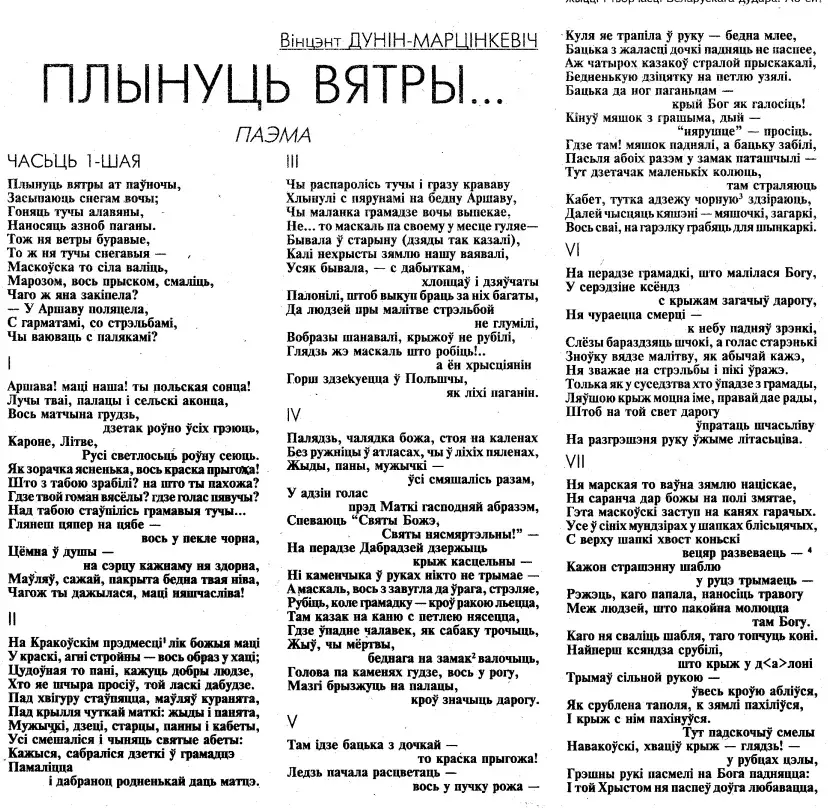
The sterility of bookstore shelves, noted by PEN experts, is now overshadowed by the emptiness of library shelves. In our classification, these are symbolic purges, but the books are most naturally sent to special storage facilities (departments of libraries, access to which is strictly limited). It’s good that they are not burnt yet, but the trend is depressing.
What in return? It is clear that Russian literature and its context don’t need to be introduced here – everything has been here for a long time. As they say, everything starts with the letter “P”: Pushkin, Prutkov, Platonov, Pelevin, Polozkova, Prilepin. In fact, literature in post-protest Belarus has become a showcase of the regime’s loyalty to its elder brother, and this visibility is ensured – surprise-surprise – by the pro-government Writers’ Union under the leadership of Aleś Karlukievič.
Thus, in the autumn, from the submission of Rahnied Małachoŭski – a poet, a representative of the middle generation of current Belarusian literature and a (hyper)active functionary of the pro-government union – it became known about the publication of “specially for the international book fair in Moscow” (in August 30 – September 2, 2023, the Belarusian pro-regime organization headed by Karlukievič took part in it) bilingual anthology “From age to age” on 700+ pages, which was put together in 2003 (!) by Aleś Kažadub and Luboŭ Turbina. This book from the “Slavic poetry” series is being reissued in Russia for the 4th time in 20 years, perhaps with some additions (in the current edition, 116 Belarusian poets are “smeared” – both living and long-dead), but this year’s version was met especially painfully: many authors, it seems, did not know about the existence of such a project, and saw their not very good quality translations into Russian for the first time. As a Russian reader wrote in response to the reprint in 2016, when the publishers carelessly publicized Siarhiej Zakońnikaŭ’s poem: “Judging by the poem shown in the illustration, Belarusian poetry does not need a translation into Russian, it only does harm. That’s why it’s worth looking at the left side of this bilingual edition: speech, understandable without translation.”
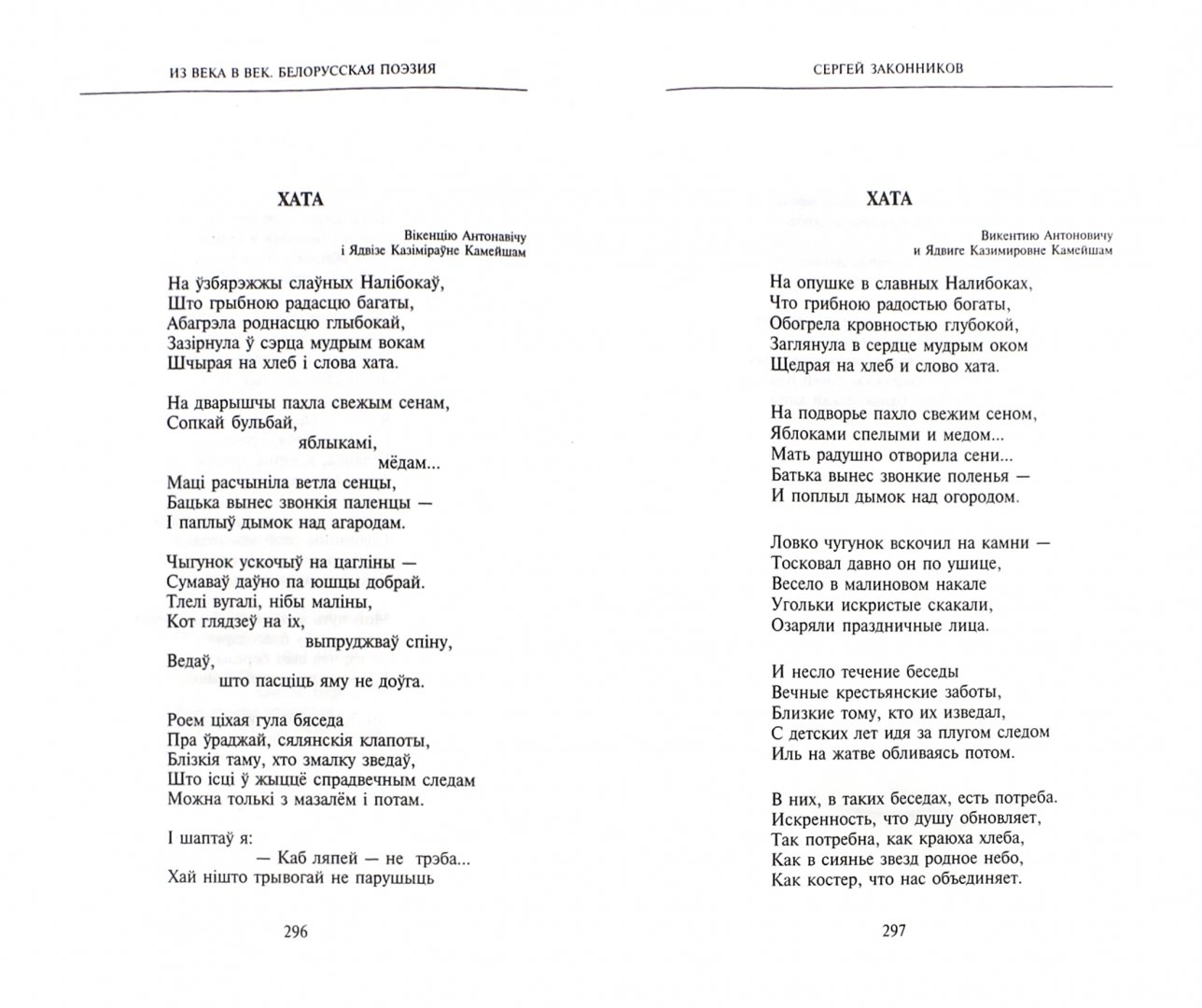
A low-quality publication, which nevertheless appears once every five years and which, according to the poet Małachoŭski, the Belarusian participants should be proud of and admire as the result of some “literary diplomacy” – it is, in our opinion, a bright marker of the vassal dependence of the official Belarusian literary process on Russia. And, actually, in the context set by Dunin-Marcinkievič and his successors, it looks like a tragicomic “Mikita Znosak level of conformism”. It is not clear why the promotion of this aspect of the activity of the pro-government Writers’ Union is managed by the well-known Rahnied – through imprudence or fulfilling some mission. But such actions can be compared with the behaviour of stray dogs. Experts say that homeless dogs attach themselves to people on beaches or streets not because they want to eat, but to feel needed by a person again (many of them were thrown away because they stopped serving well – guarding, hunting, etc.). The ostentatious cultural integration with Russia on the part of Belarusian writers is equally deplorable. Especially now, when such showy friendship is being used politically.
Actual shuffling of permitted, prohibited and dubious books on the shelves of bookstores, extremist lists that include books by Uładzimir Arłoŭ, Uładzimir Niaklajeŭ, Łarysa Hienijuš, Natalla Arsieńnieva, etc., and – at the same time – the existence of relatively safe topics for culture, to which anonymous PEN experts refer to “folk traditions, decorative and applied arts and the search for a cultural code”, – all that shows the struggle in the cultural paradigm of Belarus of two mutually exclusive trends. They are “systemic nationalism” (“systemic nationalist” – the self-definition of the propagandist of Ihar Tur) and the already mentioned “Mikita Znosak level of russification” (a radical variant of which is the “Bondarava level of russification”). The first way is characterized by waving the Belarusian cultural code in combination with complete loyalty to the regime, mild Belarusianization and sloppy patriotism. The second one can be described by the entire spectrum of promotion of the “Russian world” in Belarus: from the soft format of Karlukievič’s union to the hard format of one Hrodna resident. Though the aforementioned Dunin-Marcinkievič, attacked by pro-Russian propaganda, until recently was a solid foundation of the same cultural code that strengthens “systemic nationalism”. Like Harry Potter and Voldemort: one must die at the hand of the other, because neither can live peacefully while the other lives. It would be very entertaining to watch this epic battle of the frog and the viper while eating popcorn, if you did not have to be in the epicentre of it.
And how is it outside?
Strangely enough, against the background of splits and disturbances in many other spheres of Belarusian emigration (security forces, business, sports) and the high-profile scandal of August – the eviction of the Belarusian youth hub Aleś Łapko’s team in Warsaw by the team of Siarhiej Bulba – writers are holding on pretty well. In autumn, they simultaneously launched the process of several awards traditional for the field, including the Carlos Sherman translation award and, after a technical break for a couple of years, the “Debut” award. Without the consolidation of literary organizations abroad, this would have been problematic. Perhaps, European individualism, present in the atmosphere of Lithuania, Poland and Germany (the three main centres of relocation of our writers), simply suits Belarusian literary figures. In addition, there is a noticeable adjustment of authors around publishing initiatives: Hochroth-Minsk by Dźmitryj Strocaŭ (Berlin), Gutenberg by Valancina Andrejeva (Krakow), Januskevic/Knihauka (Warsaw), Kamunikat by Jarasłaŭ Ivaniuk (Białystok), “Lohvinau” (Vilnius), “33 books for Belarus” by Iryna Hierasimovič (Zurich), Skarynapress by Ihar Ivanoŭ (London), “Mianie niama” by Pavieł Ancipaŭ (Warsaw), Vesna by Viesna Vaško and Siarhiej Šupa, “Pflaŭmbaŭm” by Sviatłana Aleksijevič and Alena Kazłova (location unclear) and others.
Here we are talking only about legal addresses: the geography of authors and persons involved in the creation of books is very different and definitely involves Belarus. The listed publishing houses have different missions, and a wide range of Belarusian creators, we hope, has already found or will find their niche here. The advantages of “publishing there” are already obvious: the absence of absurd censorship compared to what happens in the industry internally, including the possibility to publish a topic that is taboo in Belarus (for example, the anthology of gay literature “Boys are out of control” by Skarynapress). There is also a major minus: the high cost of sending books from relocated publishing houses to readers around the world, which makes face-to-face cultural events in demand.
There was no shortage of such events abroad in the period under review either. Perhaps the most important of them is the work of the joint stand of Belarusian publishers in Frankfurt under the label of the Belarusian Book Institute, an example of the integration of free Belarusian writers into the global book publishing process, and the intellectual book festival “Pradmova”, which for five weeks in September and October brought together authors, publishers and readers in Belarusian relocation centres (Warsaw, Białystok, Vilnius, Batumi), as well as online. This initiative (especially its sessions close to the borders of Belarus) also served as a platform for the integration of relocators and booksellers working in Belarus. (We know you, we love you, we read you, but we don’t name you, so as not to jinx it.)
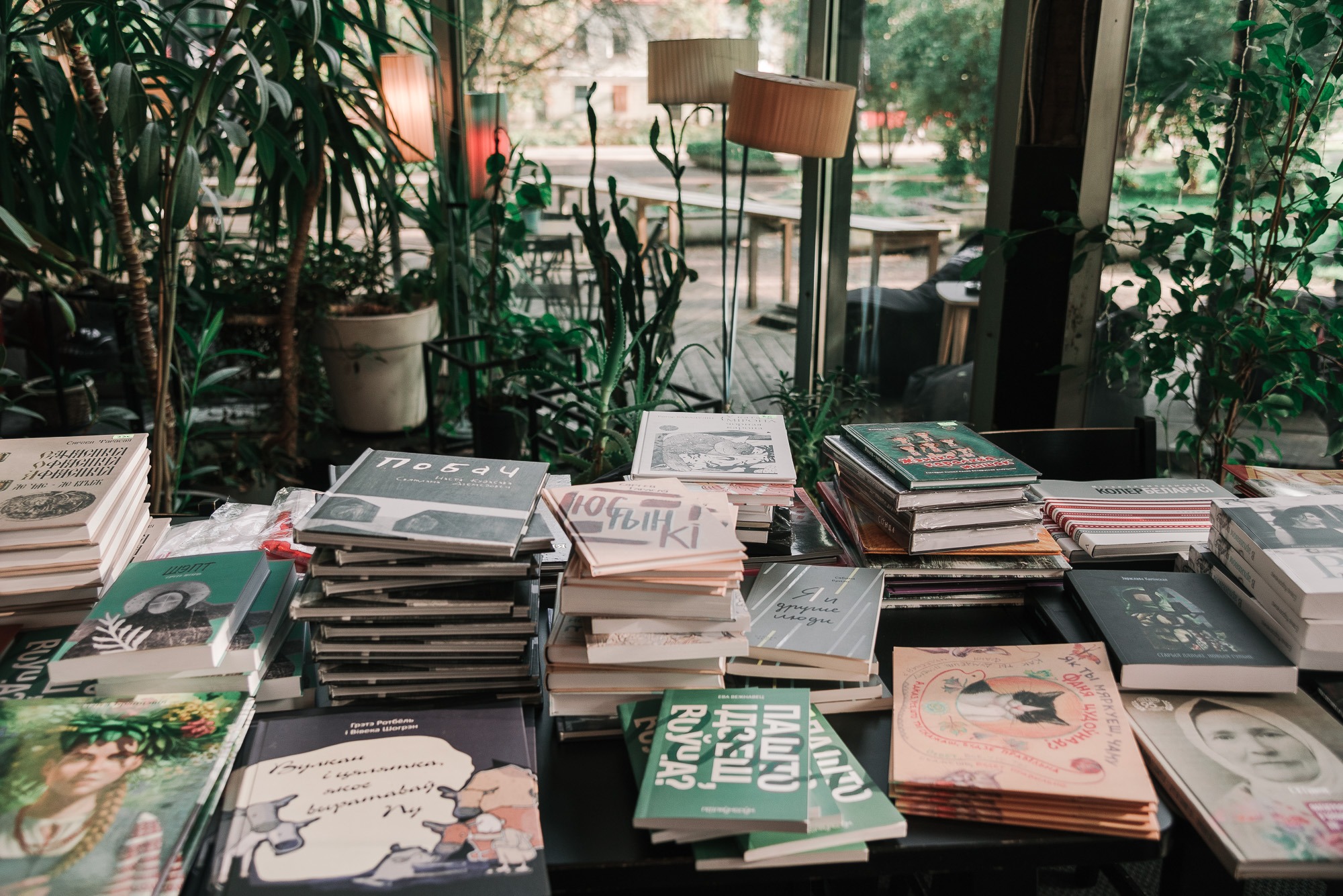
“Pradmova” revealed another distinctive feature of Belarusians as a nation, criticized by, say, Ukrainians: the desire to be liked and even loved by everyone. Now, when our cultural centres are physically dependent on European jurisdictions, there is the tangible desire of writers from outside not to quarrel with their owners, to please someone else’s conjuncture, but not to betray their audience.
The desire to get out of the Belarusian-Lithuanian media storm with Litvinism in a dignified way was palpable, when the Vilnius “Pradmova” held a serious and pathetic discussion on this topic, which was compromised by the almost complete absence of Lithuanian experts on it. It is interesting that later Belarusian and Lithuanian poets, who have been translating poems for community anthologies for ten years, spoke and declared that they do not have any international problems or misunderstandings… One way or another, it should be noted that the further we go, the more our European Belarusians become deeply concerned, if you know what we mean.
“King Stakh’s Wild Hunt” – an opera of the Belarusian Free Theatre on the stage of the British Barbican theatre – smelled of the same “desire to be fluffy cats for everyone”. The premiere took place in Belarusian with the participation of opera singers from Ukraine in September. At the same time, the creative and political expression, the mix that Mikałaj Chalezin and Natalla Kalada are strong in, left the same feeling: the creators wanted to please everyone. Did they succeed?
At the end, we remind you that the literary routine both outside Belarus and inside it is promptly accumulated by the Bellit.info website. The creators should improve the navigation of the portal, but if you look at the page more often, the saturation of the facts of our literary life, which has not disappeared, is guaranteed.
Conclusions and predictions
The literary situation in Belarus is spinning into a spiral of absurdity, and the further it continues, the louder the tensioned spring will shoot. Cynics can open a sweepstakes of who will beat whom: either Bondarava will beat the classics of Belarusian literature or vice versa. Nervous people should step away from the screens and stock up on valerian and other drops.
Belarusian people of literature in exile will undergo a test of character, diplomatic games will continue, which, we should hope, will bear fruit in the long term. But one thing is clear: the full potential of our culture and, in particular, literature can be revealed only on its own land, under conditions of freedom. It’s what everyone should strive for, no matter which vector we follow.
Belarusian cinema: (don’t) mind the gap
With a significant number of events in three months, to which this review is dedicated, I, a film critic and the author of this review, still have the feeling, if not of fatigue, then of a certain stop in the development of Belarusian cinema. This text is dedicated to trying to find out what kind of stop it is and where such dual “feelings” came from.
Trends
- Belarus is becoming a zone of silence, and it is becoming an instrument of division and power.
- State cinema is reborn into a simulation.
- Emigrant cinema is disintegrating, but continues to be institutionalized.
Community against community
We should start with the BarCamp of independent Belarusian filmmakers in August in Warsaw. Indeed, filmmakers gathered to discuss industry issues not within the framework of the festival probably for the first time in three years (or for the first time at all? Belarusian filmmakers, it seems, have never been particularly inclined to collective events).
Through all the events – meetings, discussions, master classes and film screenings, which quite well imitated the past ordinary cinema life, for which nostalgia was also felt – the hidden motive was the need for unity.
It seemed that the main problem of the filmmakers was not the loss of the minimum presence in the Belarusian space, the minimum of resources that existed, and the minimum of ordinary professional opportunities, but simply disunity – partly geographical.
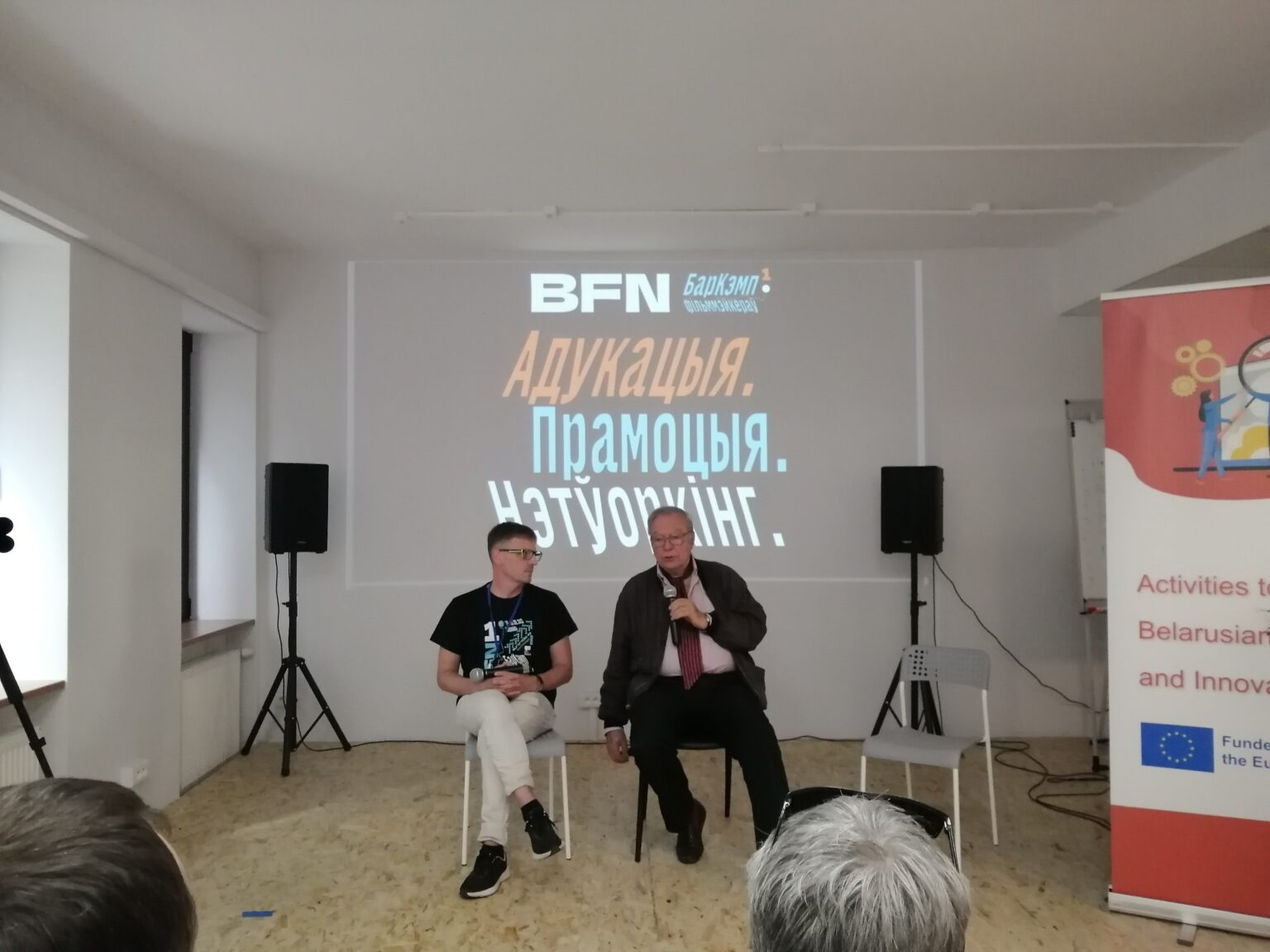
At the BarCamp, there was a vibe of new beginnings and beginners, usual for Belarusian cinema. And it became clear that this mode of existence – constant initiation on the energy of enthusiasm, without expanding resources and arranging cinema as a system – is still convenient for everyone, because it offers to continue living in a constant mode of hope, where there are only such tasks that can be solved with a pioneer-style slogan “you just have to do it – and everything will happen”.
But, of course, a lot can be done in the mode of hope and autonomous action: during the BarCamp, the Belarusian Independent Film Academy was presented, and the organizing committee of the Belarusian Filmmakers Network was also elected – institutions necessary not only for unification, but also for resisting the entropy of exile.
Soon, the Belarusian Filmmakers Network organized a seminar in Berlin on the topic of integration of filmmakers into the European industry and launched a micro-budget film incubator, reinforcing the most familiar form of existence for Belarusian filmmakers. And the most sought-after and hopeless skill is to shoot a movie for a couple of thousand dollars.
It is difficult to predict in which direction those institutions will develop, but one can already see the seductive instruments of power in the hands of the founders.
Mind the gap
This is what they suggest not to pay attention to as a natural state of affairs: part of the community that remains in Belarus, and therefore many processes in the cinema outside its borders are left in the silence zone “for security reasons”. (It is surprising that, with a careful fixation on security issues, the community has not yet spoken out or even publicly discussed the case of the film “Chronicle of Reality”, which raised the same questions – both security and the reputation of the community – and it is extremely acute. Or is this a different case?)
Such a rhetorical figure appeared naturally and inevitably in the conditions of repression. But if you look closely, you can see how it just as naturally and imperceptibly turns into a tool of influence and distribution of resources.
I wonder how long it will take for the part of the community that has the privilege of being visible to restore the entrenched Mincult pattern of power: opacity while declaring transparency, encouraging loyalty while declaring equality, favouring close relatives while declaring care for the vulnerable. I wonder if the community will be able to escape from such a familiar duality.
So far, it seems that the gap between internal and external Belarus is successfully widening, and the community is trying to preserve its well-known position: to see and not see at the same time.
At the BarCamp in August, the topic of Belarus was not hushed up, but not voiced. In September, the “Red Heather” Belarusian film critics’ award, announcing the second edition, specifically stated that it does not allow films “partly or completely created with the money of the regimes in Belarus or Russia” to be considered. Having collected 92 applications this year (4 more than in the previous edition) and presenting a long list of 71 films, “Red Heather” noted that it does not include films “whose authors wished to remain anonymous participants”.
As we can see, inner Belarus is now placed in the space between silence and denial. To be honest, the winner of this year’s edition of “Red Heather” should be – if the award wants to capture even the nerve of the times – a film without a name by an incognito author. The gap must be finally approved.
A simulation of a simulation
Meanwhile, there were many revealing events in Belarus, but, as if obeying the script of silence, they tried not to take place.
Quietly and routinely, the premiere of the film “On the other side” crept across the country on the Day of national unity, which the authorities tried to present as a high-profile event. For this purpose, a bunch of captive viewers were not just sent to the cinemas, but also forced to “consecrate their faces” on social networks with reviews about the importance of the film.
Both the film and the campaign around it confirmed: the state cinema has turned from the bureaucratic ritual that it partially was into a living and even self-replicating simulacrum.
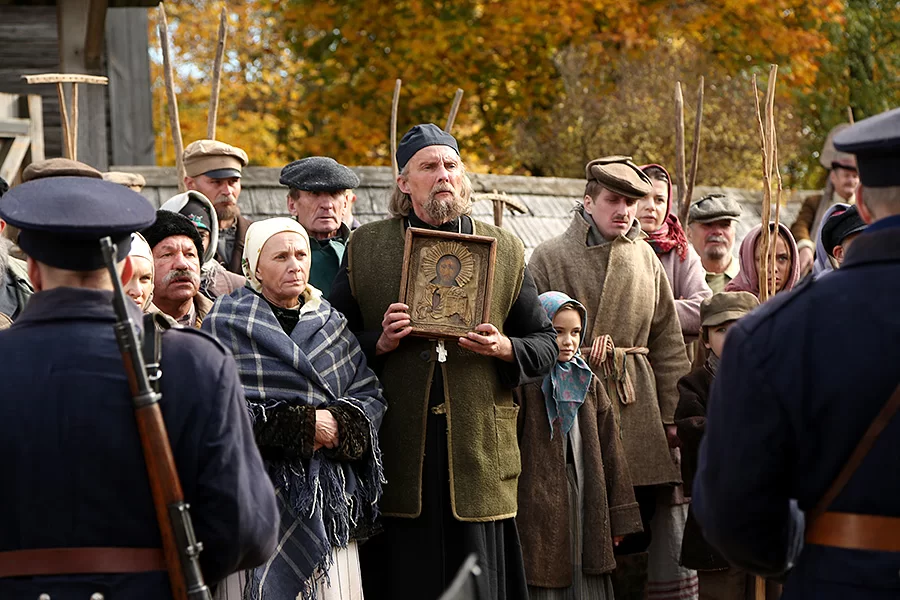
The plot about the divided Belarus was actually created in order to launch a simulation: the cinema must serve an empty ideological request with an empty, self-contained collection of serial vamps and connect an empty bureaucratic process of providing an empty cinema rental to viewers who are not interested in the film. An absolute celebration of simulation, with which there is no one to even congratulate, because the authors of the process also simulate authorship.
By the way, in the film, which no longer knows its original source – the Korš-Sablin film “Red Leaves” – there are amusing parallels with the present: with the ideological task of humiliating the image of Poland, on the contrary, the figure of non-existence is made of Soviet Belarus, which is seen at the same time as a place of ideal freedom and the real sale of contraband, and the image of Soviet Belarusians is limited to a handful of Chekists, officials and pioneers. There is also a remarkable scene of a defamation trial against communist extremists, which tells a familiar story of the officially silenced experience of the courts after 2020. Cinema, even as a simulation, sometimes reveals too much.
The leak of this film on the Internet, and then the showing on television, took place in the same quiet and ritualistic manner. They were leaked and shown – well, whatever.
Meanwhile, on the eve of the low-key premiere of the new movie, the general director of “Belarusfilm” Juryj Alaksiej promised that the studio would make a film about the protests of 2020. The challenge promises to be even more interesting if you take into account that the director had to borrow money in Russia for last year’s film. And the film crew hid so as not to be noticed.
The “Listapad” film festival, which was supposed to start on November 17, is being simulated. Two weeks before it, a strange ritual press conference was held, at which not a single name was announced, not a single title of the film, except “Filmmakers” by Kirył Chalecki, and not a single event, and the story about the festival was conducted in a fast bureaucratic automatic language. The programme was not announced a week before the festival. This simulation of a simulation no longer needs not only the original source, but even its own implementation. It is only ironic that this year it is held under the slogan “We are creating the future.”
In the same way, the animation festival “Animajoŭka” was held silently in Mahilioŭ. It passed – and that’s it, you got it.
There is no way out of the simulation except into another simulation.
Hide in “the Potato Bushes” [bulba – potato in Belarusian, translator’s note]
When this text was created, the festival “Northern Lights” (“Paŭnočnaje źziańnie”) was approaching, which offered the slogan “warning: the distance” and with it a rich, but full of perceptible confusion Belarusian programme, and Bulbamovie – with the same duality. In Ukraine, the festival of documentary films “on the border” began – this year with screenings in Odesa, Bucha, Kyiv, Lutsk and Ternopil.
The director of Bulbamovie, Janusz Gawryluk, formulated the meaning of the confusion as follows: there are fewer films from Belarus, and fewer due to the fear and caution of the authors, the cinema hung between the growing impossibility of showing what was created in Belarus and the reluctance to turn into an emigrant product.
Ihar Sukmanaŭ, the director of the Belarusian competition “Northern Lights”, says more evasively: “The phenomenon of Belarusian cinema today does not have clear outlines, boundaries and industrial perspectives.”
Confusion was also added to the Warsaw Film Festival, which this year organized pitching of Belarusian projects – and it turned out that Polish filmmakers, who were considered to be the target audience, did not come to it. And only Belarusian fans gathered in the hall.
Let this situation remain a manifestation and a side effect of the regime of hope, the only alternative to which is seen so far – non-existence (as always with the regime of hope).
All the same, for three months, Belarusian cinema had a peaceful release abroad, at festivals and in the diaspora from Warsaw to Stockholm. There were also premieres: Jury Siamaška presented the animated film “Blood and Karaoke”, Maksim Švied – the documentary “Photographer from the Square of Changes”, Taćciana Hacura-Javorskaja – the documentary “GUpoZ”, Janusz Gawryluk – the feature film “Bocian”. The ČynČyns have taken Berlin and are soon preparing the premiere of Andrej Kašpierski’s series “Processes” (“Pracesy”).
Фільм Андрэя Кашперскага “ЧынЧыны бяруць Берлін”.
Belarusian cinema even reached an extremely rare height: Hanna Badziaka and Alaksandr Michałkovič’s feature documentary film “Homeland” was nominated for the European Film Academy Award.
Conclusions and predictions
Against the background of congratulations and wishes for victory, we note that there are no Belarusians in the “homeland” among the producing countries: Sweden, Ukraine, Norway.
And if we look for predictions, then in the midst of attempts to survive at least nominally, to cocoon in micro-budget grant film production, in sporadic projects with minimal resources or affiliation with a handful of media, it is unlikely to expect at least a stated ambition and a well-defined goal – to return the silenced name Belarus to the production data of films-participants of external film festivals.
A little more temptation to use the tools of silencing – and this noble dream will also become a rhetorical figure of simulation.
While we have time, one can still watch a film – and let us finally have at least a little bit of luck.
Theatre: bet on war in Belarus, two ways for those who are abroad
The chasm between Belarusian theatre in the country and abroad is becoming wider and deeper over time. Cultural officials in Belarus dictate strict rules: productions must be about the war, sparkle with patriotism (although no one explains what this word means in this context) and focus on Russia. Foreign theatres try themselves in new roles, genres, stage plays in new languages, gather around a new community, which is about to complete the formal path to the institution. However, this freedom does not yet have a solid material foundation: the issue of premises for the Belarusian theatre in exile has not yet been resolved.
Trends
- In the repertoire and personnel policy, the bet on patriotic performances (primarily dedicated to the events of the Second World War) continues. Their inclusion in the repertoire is gradually becoming mandatory for all theatres.
- The state continues to artificially create a system of hierarchy through the selection of performances at awards and festivals, without basing them on artistic components.
- In the repertoire and personnel policy, there is a strong bet on Russia.
- After its summer festival, the Inexkult initiative moved to producing individual performances, which inevitably reduced the number of premieres abroad.
- Theatrical emigration outlined two approaches to development: preservation of its own distinctiveness or integration into the local system.
Patriotism and war
Patriotism became the trend of the new season in domestic state theatres. “Last season there were 141 theatre premieres across the country, 63 of them on a patriotic theme,” state newspaper “Zvyazda” proudly reported. Iryna Dryha, one of the heads of the Ministry of Culture, stated the need to expand the repertoire with such performances.
They do not explain which performances fit such criteria. But in general, the bet is now clearly placed on events dedicated to the Second World War.
Last season, the Musical Theatre staged “Take care of me, my love” about it. In the RTBD (the Republican Theatre of Belarusian Drama) the play “Karniej” is devoted to the same topic. In the Janka Kupała National Theatre, the following plays are declared as premieres: “Privates” based on Dudaraŭ’s work and Vasiljeŭ’s “And the dawns are quiet here”. The same “Privates” is planned in the Actor’s Studio Theatre. In the Gorky National Academic Drama Theatre they will show “a performance dedicated to the 80th anniversary of the liberation of Belarus from the German-fascist invaders.” The director (artistic director of the theatre Siarhiej Kavalčyk) has been chosen, but what kind of performance it will be, is still unknown. There is already a similar uncertain application (performance for the 80th anniversary of the liberation) from the Jakub Kołas National Academic Drama Theatre. This collective will also stage Vasil Bykaŭ’s “Sotnikaŭ”.
As you can see, the mentioned trend is not only in the capital, but also nationwide: plays about the Second World War are gradually becoming voluntary-compulsory for all Belarusian theatres. The examples of the Gorky and the Kołas theatres also testify to the fact that often teams do not know what they will perform. The main thing is to make a report on time.
Meanwhile, the mass production of “Danish” performances not only returns the domestic theatre to Soviet times, but also inevitably lowers its general level. During the 2000s and 2010s, performances devoted to this topic were not events. Among the exceptions are “Live to the premiere” (the RTBD, 2012) and “There was a talkative sparrow” (the Free Belarus Theatre, 2017). Both productions reinterpreted that conflict, and their creators (both playwrights and directors) looked at the war through the eyes of the modern generation. It is logical, because both the actors and the audience have never seen it. But in the works announced for new productions, military events are most often shown allegedly through the perception of their eyewitnesses. At the same time, the creators who are betting on a fairly traditional embodiment of those stories are mainly working on the performances. This gives no reason to hope for the artistic success of new acts.
State intervention is also observed through the artificial creation of a hierarchy system. Its evidence was another list of performances that were selected by officials and nominated for the National Theatre Competition award. Naturally, in the current conditions of repression, when the private theatre is almost destroyed and there are black lists, it is impossible to talk about some kind of objectivity a priori. And the theatre community has long been excluded from the selection of performances. But an illustrative example is the RTBD. The selectors ignored Jaŭhien Karniah’s “Pachupki” – perhaps the only performance of the last two years that caused a resonance in the theatre environment and became an event. In the final list, there is not a single performance of this team at all, and this is nonsense. After all, in the current conditions, the RTBD is one of the last theatres in the capital, which strives to maintain the previous standard.
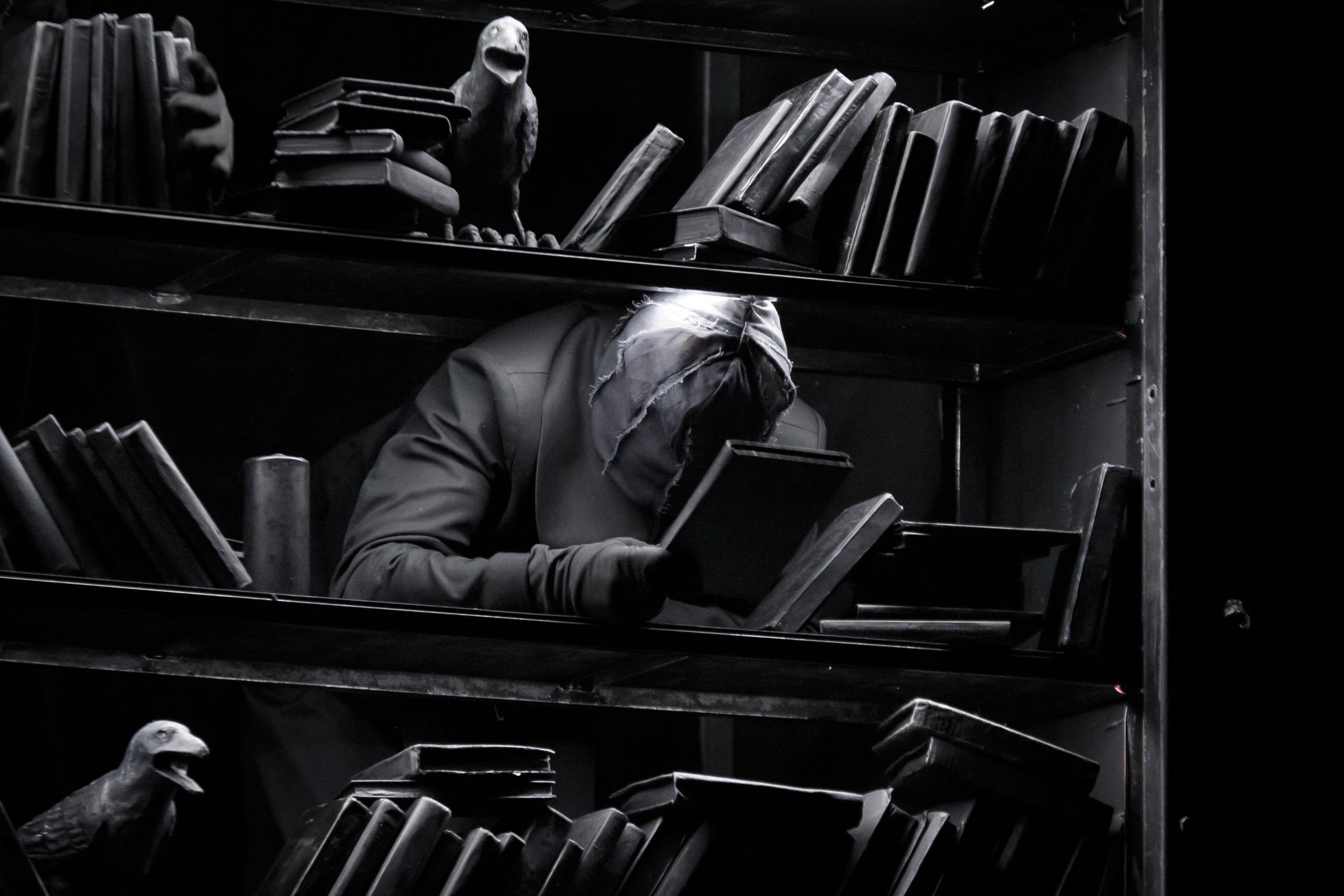
Vital Katavicki symbolically stated at the award ceremony: “We got carried away with modern drama and forgot about the vast layer of classics.” This director occupies an important position in the state hierarchy and is positioned as the chairman of the Republican expert commission in theatre art (this structure selected performances for the pro-government festival “Victory”). We state that Katavicki simply voiced the state’s approach to the theatre: no modernity – classics and patriotism.
Connection with Russia
The general direction of the state repertoire policy can be understood from the concept of the development of the national cultural space, which was uploaded on the Internet by the Ministry of Culture. Among the suggestions (the concept is still out for discussion) is to increase the number of performances based on the works of Belarusian authors. At the same time, the acquisition of foreign literature by libraries is condemned in every possible way, and there is an effort to refuse holidays, rituals and rites of foreign origin. Against this background, the Gorky Theatre (in addition to the mentioned military theatre production) announces four more performances. All of them are based on the works of Russian literature: Pushkin, Lermontov, Andreev and Sologub. It is not surprising. The bet is made on cooperation with Russia, the literature of this country is not considered foreign, but is treated as a separate category.
The emphasis on Russia is also reflected in personnel policy. Russian Artem Makarov became the new chief conductor of the Belarusian Opera Theatre in September. Meanwhile, starting in 2020, four domestic maestros were fired from the theatre: Viačasłaŭ Čarnucha-Volič, Andrej Hałanaŭ, Ivan Kaściachin and Aleh Lasun.
The connection with Russia involuntarily manifests itself in the pushing out of creators there who, for various reasons, are not ready to continue their careers in the West. For example, Nastaśsia Hrynienka became the chief director of the Irkutsk Musical Theatre. Recently, she managed her own theatre “Territory of the Musical”, but its closure left no choice.
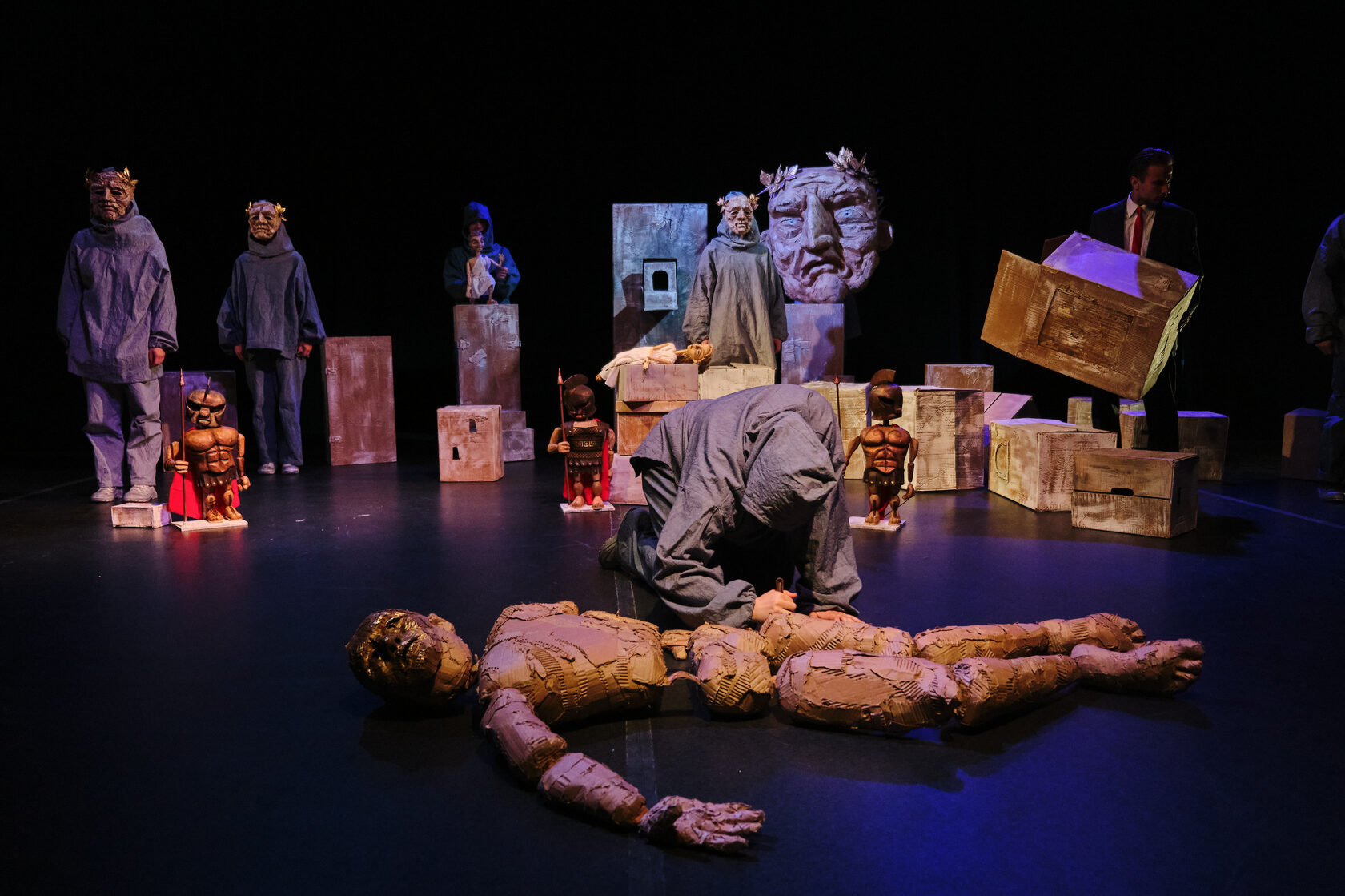
At the same time, domestic directors who have been working in the east are beginning to be perceived by local specialists as their own. “Besides “Godunov” [by Alaksandr Januškievič – author’s note], in the review poster there is another “Pushkin” story – a play by Aleh Žuhžda (as well as Januškievič, a Russian-Belarusian director)”, – writes the Russian magazine ” Theatre”. “Here we are! Now, in the eyes of an independent theatre periodical, famous Belarusian directors become Russian-Belarusian (it’s good that they are not “Russians of Belarusian origin/place of residence”). A little more – and Belarusians will again have to prove for decades that talented national artists are Belarusian cultural heritage, and not a part of someone’s empire,” comments critic Nastaśsia Pankratava.
Two ways for emigration
During the summer, the Inex Fest festival, which was mentioned in the previous review, became the biggest event of Belarusian theatrical life in exile. In August, the forum ended with the screening of the sound drama “Sarmatyja”. Volha Kulikoŭskaja, the creator of the Inexkult initiative that organizes the forum, announced its continuation and regular premieres. So far, the words do not differ from the deeds: in October, the premiere of Zoja Biełachvościk’s documentary project “My Bread” took place, which was shown in Krakow, Wroclaw, Warsaw and Sopot in Poland. However, the regularity of the premieres (one every two months) suggests that we can’t wait for summer variety yet. It is possible only once a year as a summary of the events of the season. Yes, when new productions will be available. Because so far there are not many of them.
Among them – “Till Eulenspiegel”, the latest premiere of the Warsaw Team Theatre (curator of the performance – Jura Dzivakoŭ), “Light in the Darkness” (a joint project of the “Tutejšyja” theatre and the “Tutaka” foundation, director – Andrej Saŭčanka), “Extremists” (reading of Julija Cimafiejeva’s play at the Maksim Gorki Theatre in Berlin).
In the course of the season, it is better to count on the production of Inexkult individual shows. Their regularity also depends on the existence of their own platform, which would be open to all independent Belarusian collectives working in Poland and other European countries. Kulikoŭskaja made an attempt to find it in Warsaw, announcing the voting under a petition . But the question is open.
Meanwhile, the baton passed to the Belarus Free Theatre, which held the premiere of the opera “King Stakh’s Wild Hunt” in September. The director Mikałaj Chalezin ordered a piece from the national composer Volha Padhajskaja. Thus the performance became a world premiere, which in itself is a rare phenomenon in the current conditions. And it also attracted the attention of both domestic and foreign media (primarily British, which have long been in close contact with the Belarus Free Theatre). The premiere was broadcast by Belsat TV channel, which allowed to expand the audience at the expense of the Belarusian audience.
Meanwhile, Belarusian theatregoers abroad took the first steps towards institutionalization. In September, the conference was organized in Warsaw, as a result of which the creation of the Belarusian Theatre Institute was announced. But the legal registration of the BIT is still ongoing, so it is too early to talk about practical steps.
In general, one gets the impression that the national theatre in exile is on pause before a new challenge or stage in its development. It is not for nothing that in the fall of 2023, theatregoers clearly formulated and voiced two different approaches to emigration. In practice, they have been discussed until now, but it was the first time that they were defined so clearly. The alternative is voiced as follows: to keep its distinctiveness or to integrate into the local system.
“Sometimes, some people tell me that we are doing stupid things, they say, we need to dissolve in Polish culture. I answer that I will not work in the theatre then, I will do something else. As long as there is faith that we will return, we must preserve the Belarusian theatre, culture, each of us in our place,” the director Alaksandr Harcujeŭ said.
“I realized that it is possible to play in Belarusian for a long time, but it will be for a limited audience, especially since the Belarusians who live here understand Polish,” the director Jura Dzivakoŭ noted. And he added: “Intuition suggests that it is necessary [in his performance, two Belarusian actors played in Polish – author’s note], because with performances in the language of the country you offer yourself, you show that you can work for more than one audience. In addition, there is an interesting point of difficulty in working with a language that you do not know perfectly: it helps to find visual images that are stronger than words”.
First of all, the traditional approach is embodied by Alaksandr Harcujeŭ and the troupe “Kupałaŭcy”. More radical approach is presented by the directors Jura Dzivakoŭ, Palina Dabravolskaja, Mikita Ilinčyk and other creators.
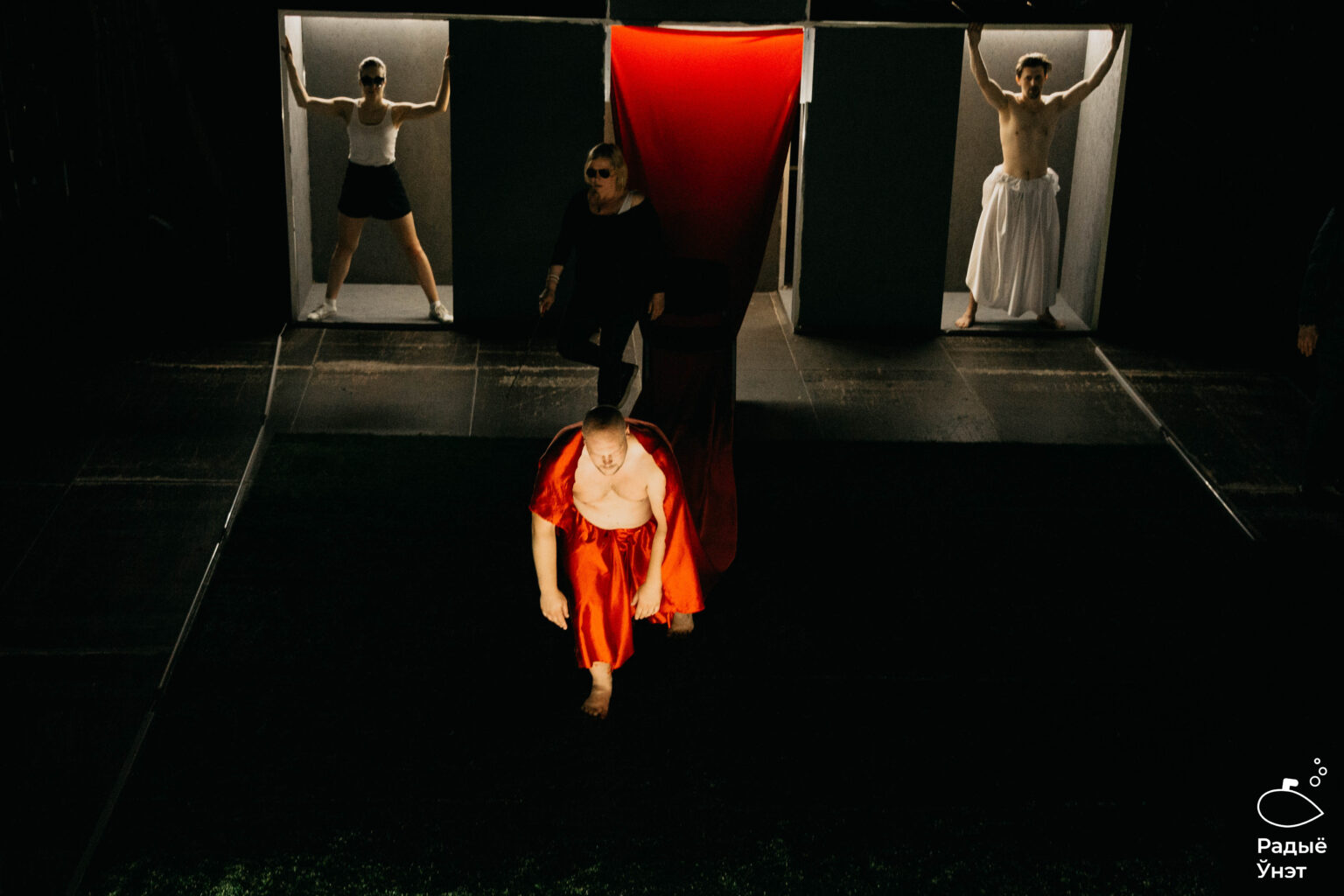
If there are no radical changes in the political sphere, these strategies will be decisive in the development of the Belarusian emigration theatre in the coming years.
Conclusions
Theatre in Belarus continues to face incessant interference in its affairs. In particular, this is manifested in the repertoire policy through the imposition of productions of a certain theme (first of all, about the war). The creation of an artificial hierarchy and an excessive emphasis on the Russian vector blur the distinctiveness of the national theatre and increasingly turn it into a deeply provincial one. Its main task is to preserve the remnants of the old, pre-revolutionary past.
Abroad, the Belarusian theatre continues to face a lack of funding, insignificant support from Belarusian institutions, etc. It has to solve problems independently. Thus, the Inexkult production initiative after the summer festival moved to the production of individual plays. The most effective way of overcoming problems so far is the activity of the Belarus Free Theatre integrated into the British Theatre system.
In general, before emigration there was a clear choice: to follow the path of the Belarus Free Theatre and integrate into the local system, or to maintain one’s distinctiveness and look for special schemes of work.
Pop & rock. Existence in a state of monologue
Belarusian music is at the crossroads. Teams and organizers working in Belarus have to adapt to increasingly strict rules of the game dictated by the regime. And the regime’s tastes are so-so, let’s be honest. The bands from the cohort of emigrants, going through the natural processes of adaptation to life in a new country, must at the same time take into account the tastes and moods of Belarusians in Belarus. It hurts everyone. This pain is compounded by Tor Band‘s judgement of creativity. Through a handful of songs with moods of disagreement, musicians received longer terms than an individual criminal would receive in our country for intentional murder.
Trends
- The state’s war on naughty art: a criminal must be in prison.
- Crisis of concert activities in Belarus: destruction of the Belarusian underground, lack of expertise and technologies.
- Emigrant albums are trying to reach the audience within the geographical borders of Belarus.
The Tor Band verdict as a signal
The chronology of the state’s relations with the musicians of Rahačoŭ Tor Band is very rapid. At first, their songs were recognized as extremist, then the creators were detained according to an administrative case. Then they added a new administrative term for each clip. Finally, the group was recognized as an extremist group and a criminal case was opened. The trial was held behind closed doors, so we don’t even know the details of the charges, but judging by the articles of the Criminal Code, the musicians were tried for inciting other social enmity, creating or participating in an extremist formation, discrediting the Republic of Belarus and insulting Łukašenka. As a result – from 7.5 to 9 years in a colony of an enhanced regime. Now we have a vivid illustration of the position of the state in relation to the creative person.
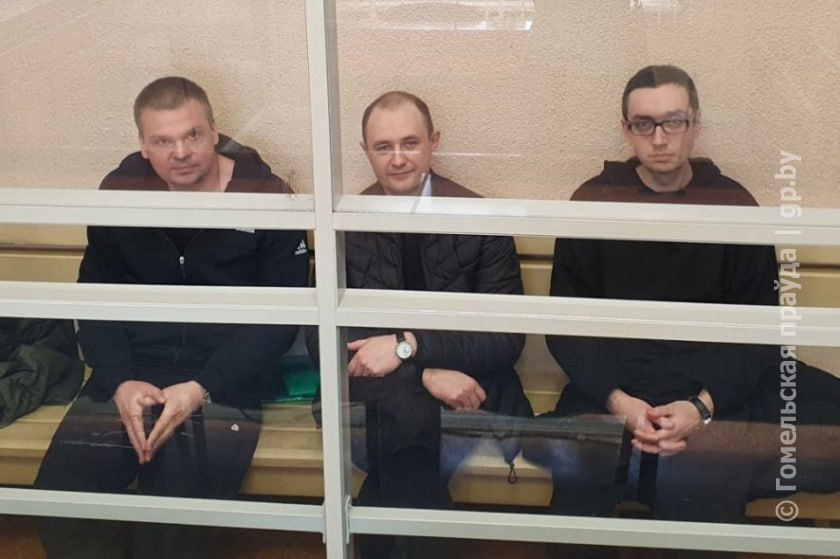
If before, inconvenient and brave musicians in Belarus could get into both mythical and at the same time real “black lists”, i.e. at most – lose the opportunity to communicate with their audience in a live format, now everything looks much worse. For inconvenient creativity and expression that does not correspond to the ideological postulates of the “leading party”, the creator faces criminal liability. The fight against creative freedom has turned into an openly repressive format: the state qualifies the creator as a criminal, and the guitar as a weapon. Such a person is dangerous to society to this extent, according to the judicial system. The state fears freedom of speech more than serious crimes. And it’s quite easy to check: the minimum sentence for intentional homicide in Belarus is 6 years.
The signal is very unequivocal: for any creative expression that does not correspond to the state’s understanding of patriotism, and even more so for criticizing the government, music will face a very painful revenge. This is no longer censorship in the form of blacklists, but open repression and even torture (during the sentence, Tor Band‘s drummer could not even get up on crutches – he has such a difficult physical condition). After such a verdict, the creator, staying in Belarus, must broadcast triple filtering of thought into the public space – just to ensure his own safety.
Concerts in Belarus: only extreme loyalty
Another important point from creative life within Belarus: concert activity is finally under complete ideological control. The country adopted a resolution on the organization and holding of cultural and spectacular events. And in this document there are many important and interesting points related to concert activities.
First of all, the so-called register of organizers of cultural and spectacular events has finally started working. Previously, there were more than 700 individuals and organizations. Now there are 58. Only ultra-loyal individuals who are officially allowed to organize concerts were included in this list. Even the largest concert company in Belarus, Atom Entertainment, which almost organized a free pro-government concert near the Palace of Sports a day before the 2020 elections and held events in the Minsk Arena during the pandemic, is missing from the document.
Secondly, now the concert activity must be the main one for the organizer. Plus, the concert company must have at least three years of experience in the field.
What will it affect? Primarily the segment of club concerts. For example, to organize an event with the participation of little-known Belarusian bands, a person must be in the register and fully meet the criteria, which is practically impossible.
Another important segment – large-scale concerts with the participation of world-class stars. Almost none of the organizers from the register has experience in conducting complex technological events. As a result, the organizer will perform a purely legal function, and the contractors will take on preparing the concert or festival. In the Belarusian coordinate system, this means corruption, money laundering and other interesting processes.
In any case, it will clearly affect both ticket prices and the quality of the organization.

Let’s look at the list of events that were waiting for Belarusians in November: Philip Kirkorov, “Lesopoval”, Russian “Song of the Year”, Didyulya – the concert programme is formed exclusively taking into account the ideas of loyal organizers about high art. In the future, this trend will become even more noticeable. We are waiting for the gradual destruction of the Belarusian underground, which serves as a quality ground for the formation of an authentic and independent national scene.
The watershed intensifies: emigrant albums
The main trend of the season is emigrant albums appearing in public space. Belarusian creators are beginning to understand the coordinate system in which they found themselves after the events of 2020, and are publishing relevant material of varying degrees of quality. Among others, two long plays should be singled out here: the album “Там” (“There”) by Leibonik and the Emihranty (Emigrants) project by Lavon Volski. Each of them offers the listener a certain reflection, but at the same time uses different artistic techniques.
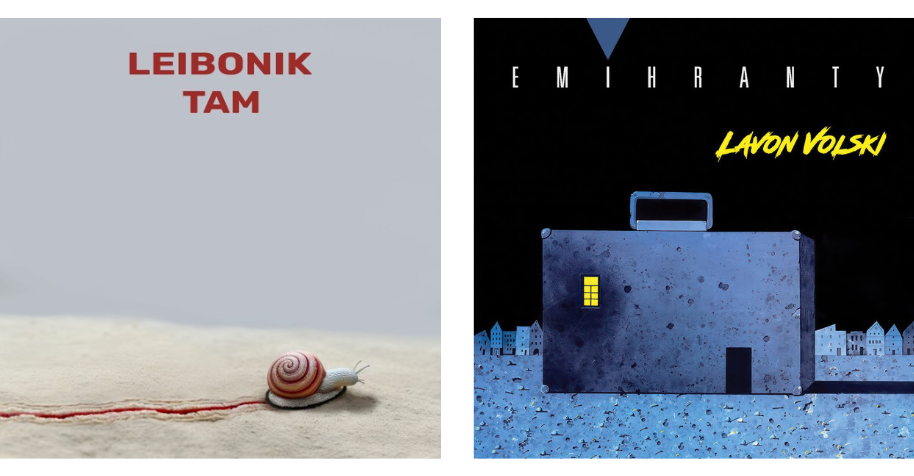
Leibonik released a text-centric album in which the position of “I” is clearly manifested: all the complexities of the inner state and emigrant circumstances are spoken in the first person and provoke dialogue. The listener allegedly takes part in the conversation and has the opportunity to empathize with the lyrical hero. The text component here has a decisive role and constructs a personal expression and its corresponding perception.
Emihranty function differently. These are caricatures of emigrant life, the accumulation of the cognitive experience of its creators: the album is characterized by generalizations and a conversation not with personalities, but with a collective Belarusian emigrant.
“Там” (“There”) is an attempt to have a dialogue with a Belarusian regardless of the geography of his/her presence, the confession of a lyrical hero with the aim of understanding and empathy. Emihranty is interacting with a narrow niche community of evacuees who are able to clearly understand this material and its geopolitical context.
In any case, the genre of emigrant songs reinforces the same mythical watershed between those who left and those who stayed, and formulates a dangerous narrative of misunderstanding. On the one hand, this is quite pragmatic work with a target audience that can provide the creator with a certain financial stability. On the other hand, the final rejection of the listener’s attention within the geographical boundaries of Belarus. What is the danger of this approach? Read about it in the conclusions.
Conclusions
The Belarusian state has finally turned inconvenient creators into criminals. Tor Band‘s sentence illustrates the fact that musicians are more dangerous to the authorities than murderers. Following that – creativity of triple filtering, total censorship and self-censorship. This is an almost unprecedented practice within modern Europe and a path to the gradual degradation of artistic narratives.
The concert activity is filtered to the maximum required by the state ideology. Now only the right people are on the lists of organizers, and this will radically affect the already almost non-existent industry. Expertise and technology will finally disappear from it, and only tours of small and large cities by pseudo-chanson followers and half-rotten stars from Russian television will remain – according to the tastes of loyal organizers.
Also under threat of destruction is an important segment of small club concerts, which contributes to the development of the local scene. In the long run, this will lead to the disappearance of interesting underground projects.
The dialogue of the emigrant scene with the listener in the country does not always take place. Opinion leaders speak pragmatically to target audiences who may be physically present at concerts.
The danger of such an approach is that they lose an inert and neutral listener in Belarus who turns to more accessible, understandable and simple options. The mythical mental divide between those who left and those who stayed is growing stronger. In the long run, this may lead to the final (self)isolation of the emigrant scene and the lack of a high-quality dialogue with the public within the geographical borders of Belarus.
Belarusian music and its actors exist in a state of monologue, and everyone pursues their goals. Creative separation contributes to the breakdown of communication and reduces the quality of creative efforts, regardless of the country of actual residence.
Belarusian Art: In the Labyrinths of Ambivalence
The Main Trends of the Season:
- International Congress and Collaborative Exhibitions: The Belarusian art scene has witnessed significant international collaboration and exhibitions in various European countries and New York.
- Artistic Solidarity with Political Prisoners: A notable trend is the increasing number of art projects and exhibitions abroad that demonstrate solidarity with Belarusian political prisoners.
- Challenges in the Domestic Art Scene: Within Belarus, artists face persecution, and there are ongoing attempts to erase public memory.
- Resurgence in Art Criticism and Exploration: The Belarusian art scene has seen a revival in art criticism and a deep dive into contemporary themes.
- Ethical Dilemmas and Internal Divisions: Events like the “Autumn Salon with Belgazprombank” continue to raise concerns about the authenticity of artistic expression in state-affiliated scenarios.
Initiatives, Collaborations, and Art Activism Abroad:
Apart from the widely recognized Belarusian Culture Congress in Warsaw, September 2023 saw a flourishing of artistic residencies, leading to various individual and group exhibitions across Europe and in New York.
Held in Warsaw on September 16-17, 2023, the First Congress of Belarusian Culture in Exile, brought together numerous Belarusian cultural figures from across Europe. It aimed to assess the state of Belarusian culture and its preservation in exile, promoting international collaboration. Discussions, led by experts like Professor Alena Hlahouskaya and researcher Natallia Hardzienka, focused on the historical and current experiences of Belarusian artists in emigration, the formation of cultural communities, and the challenges faced post-2020, especially the severance of cultural ties between Belarus and its diaspora. Artist and curator Andrei Dureika emphasized the need for broader engagement with international institutions and warned against the risks of collaborationism in Belarusian culture.
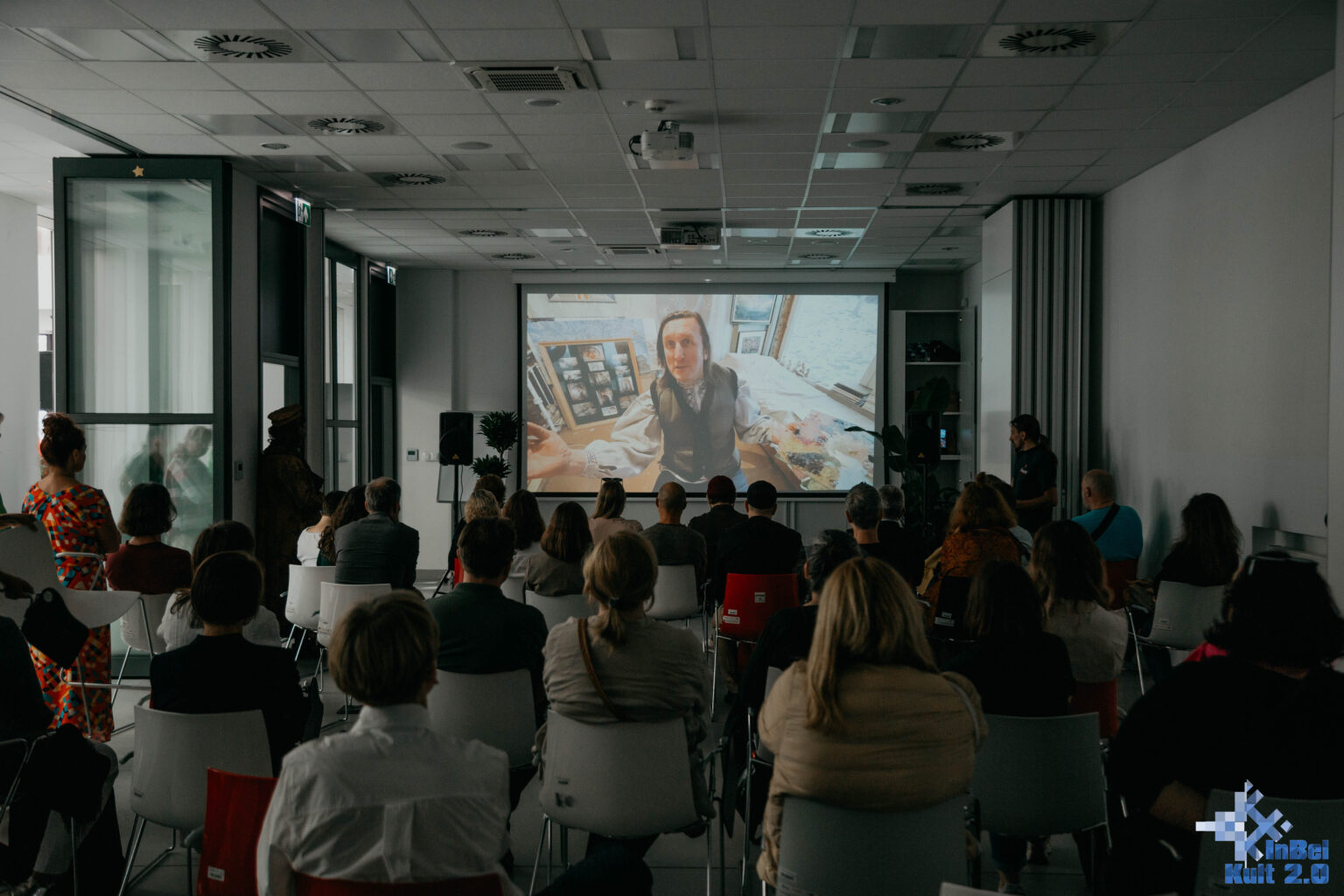
“TE-RAZ”, another panel discussion held on November 13 and 20, 2023, at the Biuro Wystaw/Foundation of Polish Contemporary Art in Warsaw showcased the works of Belarusian artists living in Poland. Volha Arkhipava initiated the program with an introductory lecture, spotlighting the contributions of Belarusian-origin artists in Poland, including the group Bergamot, Raman Tratsiuk, Jana Shostak, and Ul Pazniak. Additionally, the event provided a platform for individual artists such as Alexander Adamov, Daria Semchuk (Сemra), Vika Hrabennikava, and Anastasia Rydlevskaya to present their work, with each artist having 15-20 minutes for their self-presentations.
In the realm of Belarusian contemporary art, the prevailing theme revolves around expressing solidarity with political prisoners, as numerous artists actively advocate for global awareness regarding the victims of the Lukashenka regime. In August 2023, Belarusian artist Karalina Palyakova, in collaboration with Politzek.me, created a mosaic paying tribute to Belarusian political prisoners. Other examples of current artwork created in collaboration with Politzek.me are the art by Maxim Tyminko and Rufina Bazlova featured in “Pattern, the Grid, and Other Systems,” an exhibition which opened at the Fashion Institute of Technology in New York on October 27, 2023. Maxim Tyminko’s video loop “A Percussion Piece for Two Thousand and Nine Players.” Rufina Bazlova’s “Framed in Belarus” showcases portraits of illegally convicted Belarusian citizens using traditional Belarusian embroidery.
Opening on September 8, 2023 in Dresden at the Japanische Palais, “Café Belarus II: Kassandra Komplex” featured the works of Belarusian artist duo 1+1=1, Antanina Slabodchykava and Mikhail Gulin. Focusing on the struggle for artistic freedom, the exhibition comprises 26 works including films, performances, drawings, installations, and new graphic and multimedia pieces, reflecting on the complex dynamics of myth and power in authoritarian systems. Both Slabodchykava and Gulin have been part of the Martin Roth Initiative fellowship program since October 2022, which supports artists facing persecution in their home countries.
Among the numerous exhibitions featuring Belarusian artists held throughout Europe, one that truly stands out is Zhanna Gladko’s solo exhibition titled “Relentless Flow Of Time,” which opened in Oslo on November 2nd. Currently, Gladko is participating in the Safemuse Artistic Residency’s Oslo Safe Artistic Haven program. Her artistic endeavors are centered around the creation of ambivalent imagery that critically delves into the phenomenon of information deformation in the post-truth era, where information is layered, distorted, and devalued.
Recent developments in Belarusian art criticism have seen a resurgence in publishing critical texts and essays. Notably, the Kallektar.org platform published Andrei Dureika’s essay “From the Other Side: In memory of Ales Pushkin” in August 2023, highlighting the life and work of the late renowned Belarusian artist and political prisoner Ales Pushkin. Pushkin’s multifaceted art spanned painting, theater, performance, and political activism, blending contemporary and traditional styles while addressing societal and historical contradictions. His work was notable for its political themes and the seamless integration of life and art into a myth-like narrative.
Domestic Art Scene: Complexities and Contradictions
The Belarusian art community continues to endure significant losses, persecutions, and attempts to erase public memory under the current regime. Several artists remain incarcerated as hostages to the Lukashenka regime, including digital artist Viktar Kulinka, street artist Dzmitry Padrez, artist, designer, and animator Ivan Viarbitsky, artist and illustrator Aliaksandr Nudzinau, and artist and former leader of the Pahonia society, Hennadz Drazdou.
In a poignant loss for the community, Belarusian art historian Larisa Finkelstein passed away on November 21st at the age of 73. Her colleagues shared the news on social media. She was a prominent figure in contemporary Belarusian art, with a career spanning several decades at the Minsk Palace of Arts and her gallery, “Brama.” Finkelstein also contributed significantly to art education and media, leaving a lasting impact through her teaching and publications. Her funeral took place in Minsk on November 23rd.
In a stark example of cultural erasure, a fresco at the Saint Dormition Monastery in Zhirovichi, created by the late Raman Bandarenka, was painted over. Bandarenka, who tragically died following detention in Minsk, had originally made the fresco in June 2007. This artwork, a symbol of Bandarenka’s legacy, has been replaced with an image of “The Last Supper,” with the commemorative plaque also removed. This action underscores the ongoing struggle for justice in the wake of Bandarenka’s murder by the Lukashenka regime three years ago.
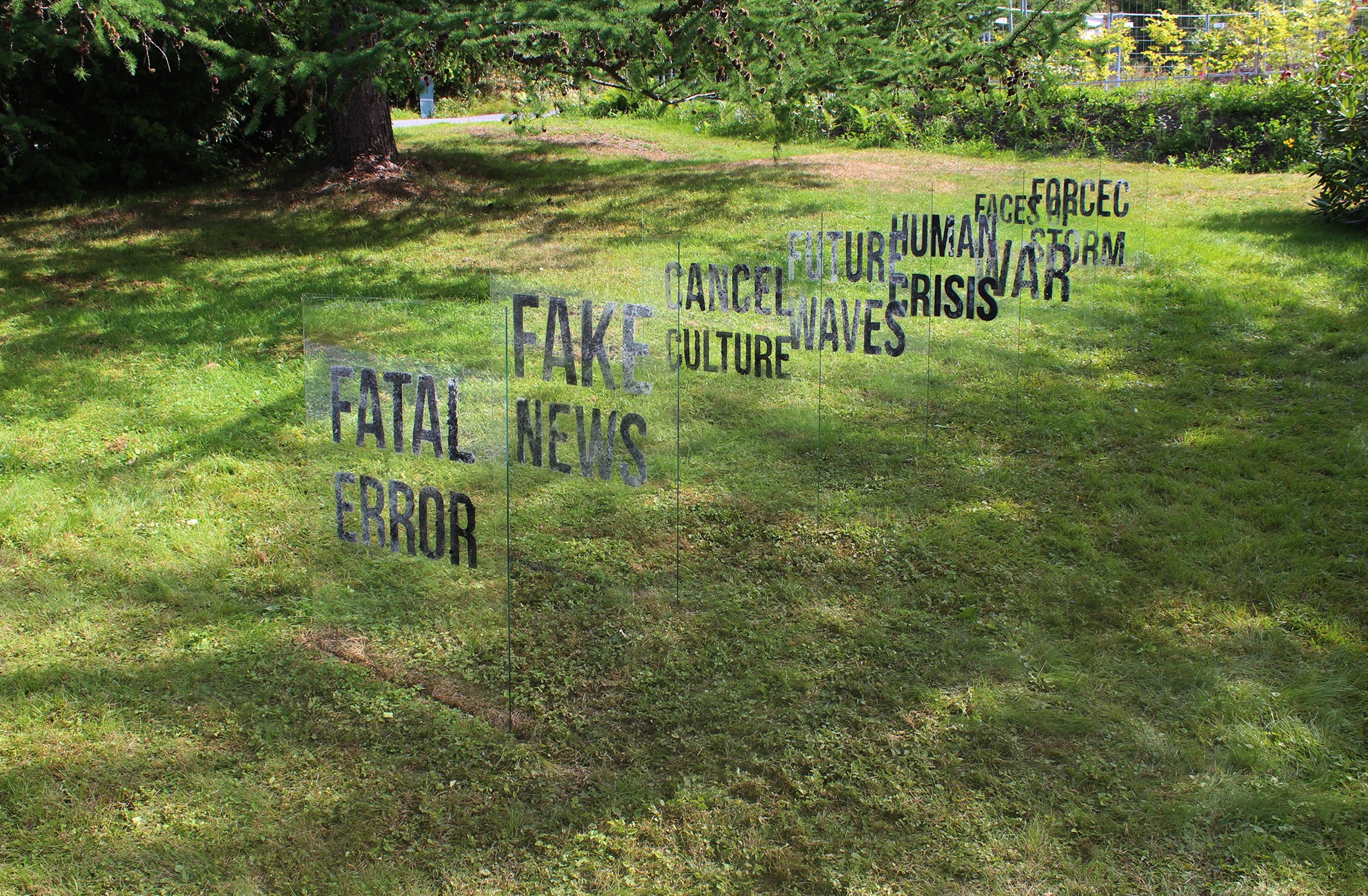
The recent events in the Belarusian art scene, while notable, raise questions about the true revitalization of domestic art due to the complex moral dynamics at play. From September 7th to October 2nd, the Palace of Arts in Minsk held the “Autumn Salon with Belgazprombank,” an exhibition-sale featuring young Belarusian artists. Despite showcasing over 430 works by 246 artists, and gaining notoriety as a key cultural event, there’s a lingering skepticism about the authenticity and freedom of artistic expression in such state-affiliated events.
Alexey Kuzmich, a controversial artist known for his protest performances, recently made a cautious return to Belarus. His visit, aimed at finalizing his “Transit” project and renewing personal documents, was shrouded in tension and risk, given his history of administrative arrest and the need to remain incognito. This visit, though successful, underscores the precariousness and ambiguity that many artists face in Belarus, where love for their homeland coexists with a palpable discomfort.
Ролік Аляксея Кузьміча Transit, or Ass backwards. 2020/08/09 – 2023/10/09
The spotlight on Belarusian contemporary art by Karen Karnak on Syg.ma, featuring artists like Raman Aksionau, is also tinged with complexity. While Aksionau’s “Antiprojects,” add to the rich tapestry of Belarusian art, the artist’s collaboration with Russian platforms and the internal divisions it causes within the art community highlight the ongoing struggles and ethical conundrums faced by Belarusian artists today. These developments suggest that while there is movement in the Belarusian art scene, it is fraught with moral ambiguity and challenges that question the possibility of a true revitalization under the current circumstances.
Summary and Predictions
- Continued International Collaboration: The Belarusian art community is anticipated to uphold and enhance its global presence through curatorial initiatives, group and exhibitions, showcasing talent from Belarus on an international scale.
- Art as a Medium for Political Solidarity: The trend of using art to show solidarity with political prisoners and to address socio-political issues in Belarus is anticipated to persist. This may result in more exhibitions and art projects, both in Belarus and internationally, that highlight the country’s political struggles.
- Domestic Art Scene Under Scrutiny: The Belarusian domestic art scene will likely continue to face challenges due to political repression and censorship. However, this may also lead to a surge in underground and more subtle forms of artistic expression that navigate the restrictive environment.
- Growth in Critical Art Discourse: There will be an increase in critical texts and discussions around Belarusian art. Platforms like Kallektar.org will play a pivotal role in bringing Belarusian contemporary art to a wider audience and fostering critical discourse.
- Ethical and Moral Challenges: The Belarusian art community will continue grappling with ethical dilemmas, particularly concerning collaborations with the pro-Lukashenka and Russian entities. This may lead to more pronounced internal divisions within the art community, but also could spark new dialogues and reflections on the role of art in a politically oppressive environment.
Analytical group of the Belarusian Council for Culture


